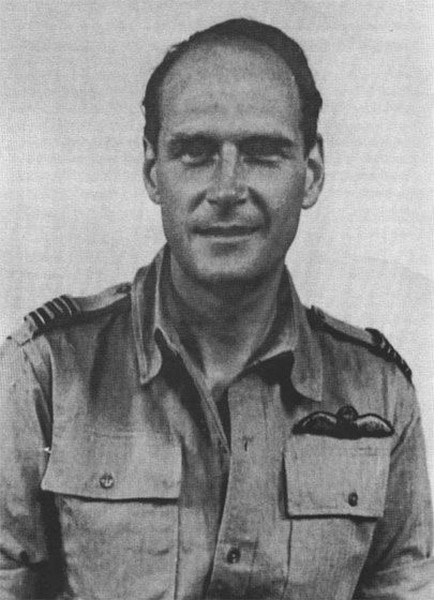Czernin, Manfred Maria Edmund Ralph Beckett
- Date of birth:
- January 18th, 1918 (Berlin/Prussia, Germany)
- Date of death:
- October 9th, 1962 (London, Great Britain)
- Service number:
- 37148
- Nationality:
- British
Biography
Full name: Count Manfred Maria Edmund Ralph Beckett Czernin von und zu Chudenitz.
Manfred Czernin was born January 18th, 1918 in Berlin, the fourth son of Count Otto von Czernin en Lucy Beckett. After the divorce of his parents, he moved to Italy with his mother and later on he went to England where he was educated at Oundle School. In 1931 he left for Rhodesia with his mother. Czernin returned to England April 1935 and served as Acting Pilot Officer with the R.A.F. for a short period. He was drafted at the outbreak of war. During WW 2 he saw service in various R.A.F. squadrons, as Staff Officer Air Groups and as Staff Officer/Agent of SOE.
Promotions:
April 1935: Acting Pilot Officer;
December 1941: Acting Squadron Leader;
?: Squadron Leader.
Career:
1935: No. 57 Squadron, RAF Upper Heyford;
January 1940: No. 504 Squadron, RAF Debden;
January 1940: No. 213 Squadron, RAF Wittering;
May 1940: No. 85 Squadron;
?: No. 17 Squadron;
May 1941: Operational Training Unit, RAF Debden;
February 1942: Commanding Officer No. 146 Squadron;
?: Staff Officer No. 224 Group;
?: Staff Officer No. 28 Group, RAF Uxbridge;
?: Staff Officer Special Operations Executive.
Do you have more information about this person? Inform us!
- Period:
- Second World War (1939-1945)
- Rank:
- Flying Officer
- Unit:
- No. 17 Squadron, Royal Air Force
- Awarded on:
- October 1st, 1940
"This officer has displayed great keanness in his desire to engage the enemy and has destroyed nine of their aircraft. In August 1940 he led his section in a head on attack on large formations of enemy aircraft, destroying three of them."
- Period:
- Second World War (1939-1945)
- Rank:
- Squadron Leader
- Unit:
- J Section, Special Operations Executive (SOE), British Government
- Awarded on:
- December 1st, 1944
"On the night of 12-13 June 1944, Squadron Leader Czernin and his Wireless Operator were to be dropped into enemy-occupied territory, but the reception signals were not satisfactory and they returned to base. On the following night, the reception was again incorrect. Entirely regardless of his own safety, Squadron Leader Czernin decided to jump with a view to making a personal reconnaissance of the situation. This he did without arms of any description and with the full knowledge that the Germans are constantly arranging bogus receptions for the receipt of Allied personnel and stores. On landing, he found the reception committee to be friendly. Thereupon he flashed a signal to the aircraft which dropped the Wireless Operator and equipment. But for this courageous action, a most vital operation would have had to be postponed at a stage when the time was of the utmost importance to the success of the major plan."
- Period:
- Second World War (1939-1945)
- Rank:
- Squadron Leader
- Unit:
- J Section, Special Operations Executive (SOE), British Government
- Awarded on:
- October 30th, 1945
"‘Squadron Leader Czernin was parachuted behind enemy lines in N.W. Italy on 21 March 1945. His task was to co-ordinate the various scattered Partisan units into a unified command and with these forces to carry out the directions of 15 Army Group. In order to reach his area of operation in the Bergamasco district, he had to cross the 9,000 ft. Passo del Diaviolo which was completely covered with snow six feet deep. He made two attempts to cross the pass but without success. At 4 a.m. on 4 April he made a further effort and after marching continuously for 24 hours, suffering severely from cold, frost bite and lack of food, he succeeded in crossing the pass. Squadron Leader Czernin immediately commenced to organise the various Partisan forces and by his energy and personality quickly built up a large aggressive Partisan Command. This force, under his direction, went into action on 28 April 1945. He secured the unconditional surrender of three enemy garrisons whilst other forces under his command eliminated or captured the garrisons of three other places. Later the same day, after the whole area had been cleared of the enemy, he, with the Partisan Leader, drove into Bergamo in a car draped with the Union Jack to demand the unconditional surrender of the German Forces. The Germans opened fire and Squadron Leader Czernin was forced to withdraw. He then ordered the Partisans to attack the city and arranged for the underground elements in Bergamo to rise simultaneously. At 7 a.m. on 28 April 1945, Squadron Leader Czernin obtained an unconditional surrender from the German General. Throughout this period in the field Squadron Leader Czernin displayed the highest qualities of leadership and by his courage and daring made a noteable contribution to the Allied success in North Italy.’
- Period:
- Second World War (1939-1945)
- Period:
- Second World War (1939-1945)
- Period:
- Second World War (1939-1945)
- Period:
- Second World War (1939-1945)
- Period:
- Second World War (1939-1945)
Sources
- Photo 1: Capt. Lynn R. McR. Hawkins
- - The London Gazette, Issue 34958, dated Tuesday 1st October 1940
- The London Gazette, 1 December 1944
- The London Gazette, 30 October 1945
- The British Medal Forum











